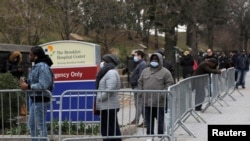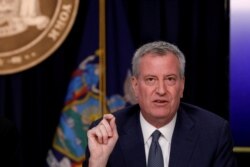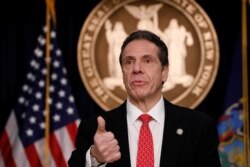New York’s mayor called on U.S. President Donald Trump to deploy military personnel to his city, which he said is the front line in the country’s war against the coronavirus.
“The great irony [is] the fate of New York City rests in the hands of one man and he is a New Yorker, and right now he is betraying the city he comes from — we are the front line,” an angry Mayor Bill de Blasio said at a news conference Thursday evening. “How on Earth is the president sitting idly by and not activating the forces that could help us?”
Trump did agree Wednesday to deploy a 1,000-bed naval hospital ship to the city, but it will not arrive until next month. It is expected to treat noncoronavirus cases, in an effort to relieve some of the burden on the city’s hospitals as they become more overwhelmed with virus cases.
New York state and the city lead the nation in the number of confirmed coronavirus cases. In total, there are more than 7,500 cases statewide.
To put it in context, on Monday, there were 950 recorded cases statewide.
De Blasio said the city now has 3,615 cases and 22 people have died. That is a more than a twofold increase from Wednesday’s total, which was 1,339 cases. City deaths have doubled overnight from 11 to 22. Nearly 170 people are in intensive care units.
New York’s infection numbers have been rapidly escalating as testing has become more widely available.
De Blasio warned that in a few weeks the situation would become “extraordinarily difficult” without help from the federal government.
“But as we get into April, the farther we get into April, the more we will need the help of the federal government — it must arrive in time,” he said. “But if the federal government does not do all in its power immediately, it is as simple as this: There will be a lot more people who get sick who didn’t need to get sick, and there will be people who die who didn’t need to die,” he said.
On Tuesday, the mayor appealed to retired health care workers to come back and assist in the crisis. He said in the past 48 hours, more than 1,700 professionals had answered his call.
De Blasio also urged the federal government to use its Defense Production Act powers to demand American factories step up production of critical medical supplies. He said the city has reserves to keep hospitals only for another two to three weeks.
On the list of critical supplies: 3 million N95 masks, 50 million surgical masks, 15,000 ventilators and 25 million each of surgical gowns, coveralls, latex gloves and face masks.
‘Misinformation and fear’
Earlier Thursday, the state’s governor, Andrew Cuomo, said misinformation and fear related to the virus were complicating the situation.
“We now have misinformation and fear and panic, which is as contagious or more contagious than the virus,” Cuomo told reporters in the state’s capital, Albany. “We have to deal with both of them.”
He said clear and consistent communication from the media, health care professionals and elected officials was necessary as efforts continue to slow and stop the spread of the potentially deadly respiratory virus.
The governor also announced he was tightening a restriction put in place on Wednesday intended to lessen the density of people outside their homes.
Instead of 50% of business’ workforce being allowed to be on site, Cuomo said he was reducing that to 25%. There are exceptions for essential services, including grocery stores, pharmacies and shipping companies.
As thousands of people are in fear for their jobs, Cuomo announced measures to absorb some of the social impact of income loss.
Across New York state there will be 90-day mortgage relief for persons who have been impacted by the virus and cannot meet their payments. No homes will be foreclosed on by banks, and fees will be waived for credit cards and at cash machines.






